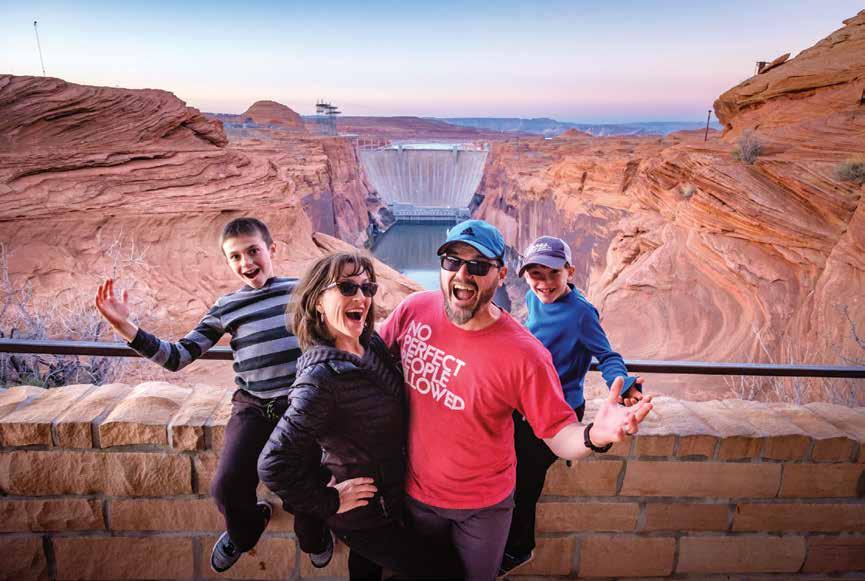
16 minute read
The World Is Their Classroom
Local families share their “worldschooling” adventures.
Words by Betsy Jewell
Advertisement
The Buoy Family Photo: OurBasicEssentials.com
The term “homeschooling” indicates that learning takes place at home, but for some adventurous families, the absolute opposite is true. “Worldschooling” is the combination of education and travel. This method allows families to provide an educational experience for their children by experiencing and interacting with the world around them. Now may not be the time to start traveling the world, but the Central Florida families interviewed for this article began their worldschooling journeys long before the COVID-19 pandemic. We’re sharing their stories here as inspiration for families who may be considering all of the possibilities that exist for nontraditional education in the future.

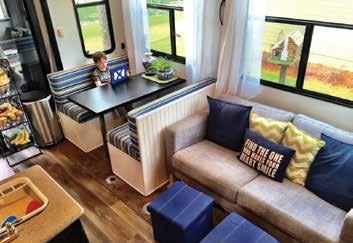

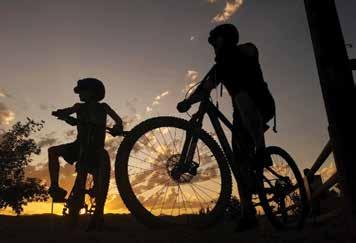
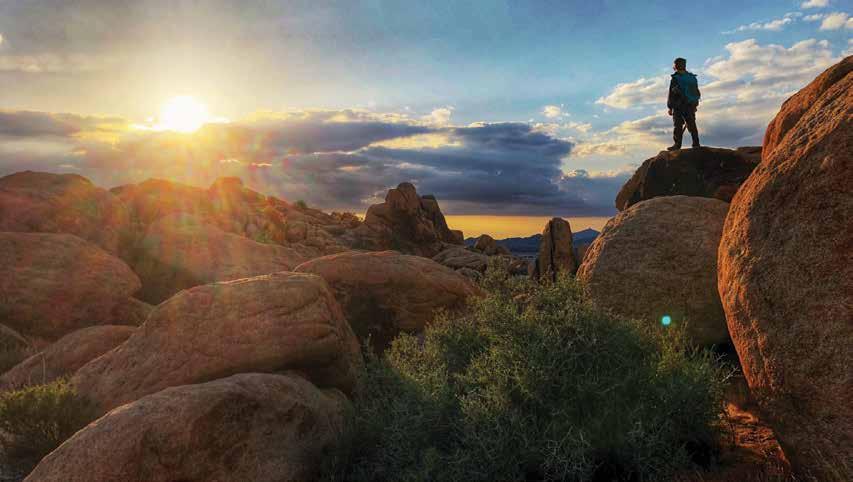
Living Off the Grid in the Southwest Desert
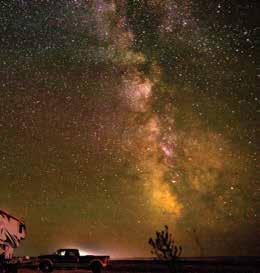
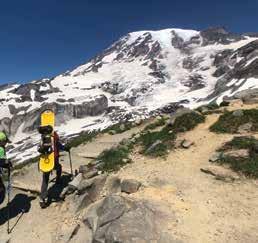
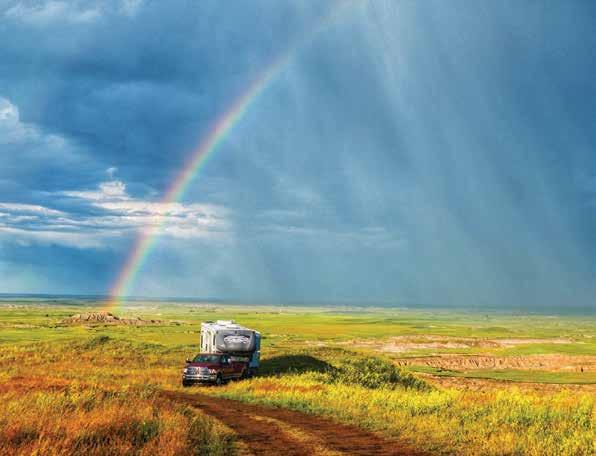
Photos courtesy of The Buoy Family | OurBasicEssentials.com
In the middle of the New Mexico desert, Ann and Mike Buoy and their two boys, Bryce, 13, and Brooks, 11, are social distancing in their 340 square-foot home, a recreational vehicle
(RV). This high-tech home-on-wheels, which they affectionately named ChronicNomadness, allows the family to live, work and adventure from anywhere. In addition to typical RV campgrounds, the Buoys often “boondock” by camping off the grid on public lands such as national forests. The Buoys weren’t always worldschoolers. Up until 2015, the family lived in Altamonte Springs, Florida. The boys were attending public school, Ann and Mike had a thriving photography business, and by all accounts, their life was good. But then things began to unravel. Ann was in a terrible car accident, diagnosed with fibromyalgia and then suffered a serious medical scare. After healing herself naturally, Ann decided to change careers and earned her certification as a holistic health coach. Mike works in instructional technology and design. During this time, Brooks was suffering with headaches 90% of the time, and Bryce started asking to be homeschooled. Knowing that Mike could do his job from any location, the family decided to take the leap and hit the road. They sold their house along with most of their belongings, purchased a truck and RV and began their adventure. This was a new world for the Buoys — they had no experience RVing or worldschooling, but they knew it was the right decision for their family. Ann does most of the schooling as Mike works full-time remotely. The family has an assortment of technology and gaming devices with parental controls in place, and both boys are voracious readers. They have plenty of time to read books of their choice. The boys are different in their interests and learning styles, so the family started out using a mix of resources, including Easy Peasy, Minecraft Homeschool (now called GamED Academy), Khan Academy, IXL, BrainPop videos, TED Talks and educational apps. In 2017, Ann enrolled both boys in Florida Virtual School (FLVS). Bryce enjoys being able to work at his own pace, which allowed him to complete 7 th and 8 th grade science in one year. He usually finishes his FLVS schoolwork in just a few hours each day. Living nomadically is rewarding but can have its challenges. The Buoys need to find locations with reliable internet so Mike can do his job. Sometimes things break and go wrong. In the beginning, Ann struggled with getting the boys to respect her as the teacher. When they pick up and move to a new location, the boys don’t enjoy having to say goodbye to their friends. In their current location, the Buoys are completely off the grid with no power or water. They generate their own power using solar panels and must drive 15 minutes to fill their RV’s water bladder and buy supplies every week. The Buoys have gotten good at “unplanning” and don’t map out their location in advance. Sometimes they choose a city and figure out a specific location later. But no matter where they are based, the Buoy family loves to adventure, taking lots of day trips to explore the local area. They enjoy being active, whether it’s hiking, paddle boarding, snowboarding, rock climbing or mountain biking. Even though they can’t visit national parks or other public places right now, they always find time to get outdoors and enjoy the scenery. Ann has lots of helpful advice for parents who are considering homeschooling or worldschooling their children. “Be sure to take breaks. Go outside. Give yourself some grace. Homeschooling isn’t bringing the classroom to the home. It’s about creating an environment that facilitates your child’s love of learning.”
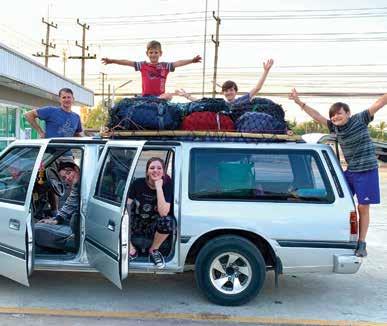
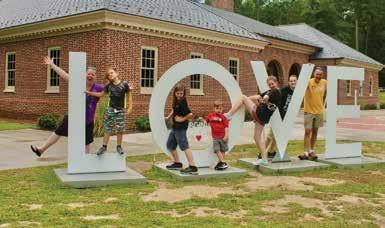

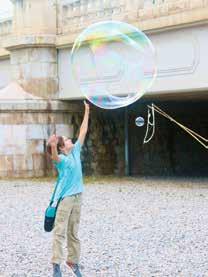
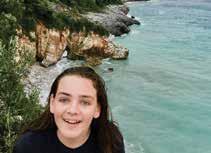
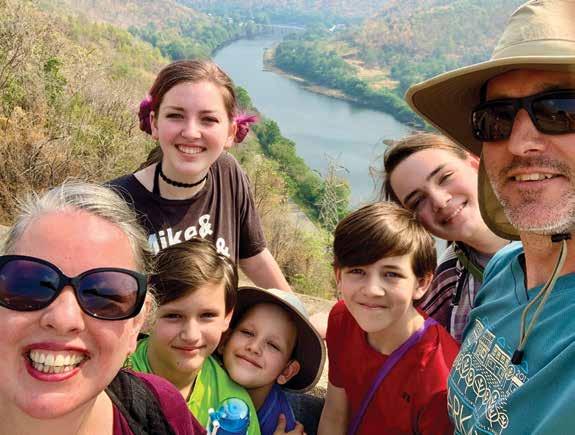
Family of Seven Learning on a Full-Time Field Trip
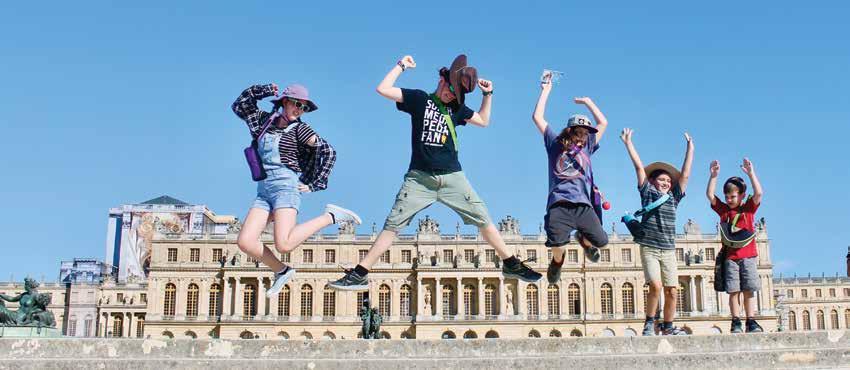
Photos courtesy of FullTimeFieldTrip.com
Johor Bahru is the southernmost city in Malaysia and the place Regina, Tom and their five children, Txanton, Trevor,
Trace, Tucker and Tyleigh, currently call home. Ranging in age from 7 to 16, all five children were born in the United States and have been homeschooled since day one. Tom and Regina decided early on that homeschooling was the best choice for their family. Their original plan was to buy an RV and travel the states. They kept putting it off because it never felt like the right time. Regina started researching international travel and what it might look like for her family. What she found led her to a life-changing moment. “I realized that we can travel the world full-time cheaper than we can live in the United States.” Regina and Tom both had a yearning to travel the world. About two years ago, while living in Central Florida, Regina and Tom began investigating ways they could fund travel for their family. Tom owned and operated a handyman business, and Regina had an education background. They thought long and hard about the transferrable skills they already possessed that could help them make their travel dream a reality. First up, an opportunity in Thailand to do work exchange. Tom was able to use his handyman skills to rehab a house that was sitting empty, and the family was able to live in the house during the project. Regina says that work exchange and bartering are ideal for finding a place to stay. Next stop, Egypt, where Tom utilized his handyman skills while working for a street dog rescue. In Spain, they traded babysitting for housing by working as live-in nannies. Regina and Tom also have steady income earned through renting their home back in Florida on AirBNB. Regina and Tom have always asked their children what they want in their education journey. Their family typically takes a unit study approach that allows them to anchor their learning to one topic and then customize the lessons to be age-appropriate for each child. The family classifies their learning into three types of experiences: fast travel, which is where they visit a city and do a lot of sightseeing; slow travel, which is where they stay in one place and soak up as much as possible for as long as their tourist visa will allow; and expat life, which is what they did while in Thailand. They enrolled their kids in school, and Regina took a teaching position. This was a much deeper educational experience for the whole family. Regina says that the longer you stay in any one place, the more you know what types of cultural aspects to look for and experience with your children. While traveling from one destination to another, Regina, Tom and their children have created friendships all over the world. There are some formal organizations that offer worldschooling conferences with seminars, workshops and group housing. Also available are more informal meetups where someone posts a location and others in the area attend. Either way, these gatherings are a great way to connect with other families. The hardest thing about worldschooling for Regina, Tom and their kids is missing their friends and family back in the states. They stay connected online but wish they could see them in person and give them a hug. As of right now, their family is staying put in Malaysia as they wait to see what the pandemic brings. One of the best things about worldschooling? Deepening family connections. Because Regina and her family are living differently than they were in the U.S., they have opportunities to connect on a deeper level. They are living in the world in a whole new way. More than anything, says Regina, “Travel teaches you resilience. You have to be willing to go with the flow. Roll with the changes. Deal with the disappointments. You learn to live with uncertainty. Surrender to the uncertainty. Whatever comes up, you just find a way to make it work.” Regina’s best piece of advice for families planning to worldschool is, “You only need half of what you are packing. It’s so easy to think that we need all these just-in-case items or need to recreate our homes in our suitcases. Everything you think you will need can be found wherever you go in the world.”
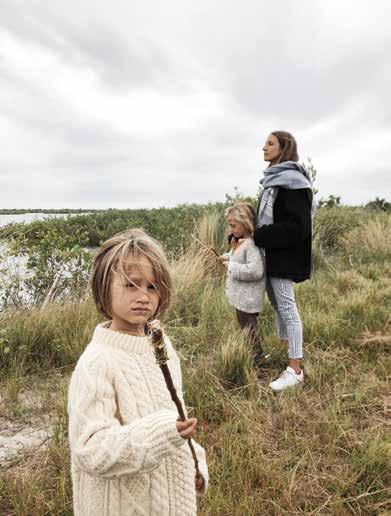
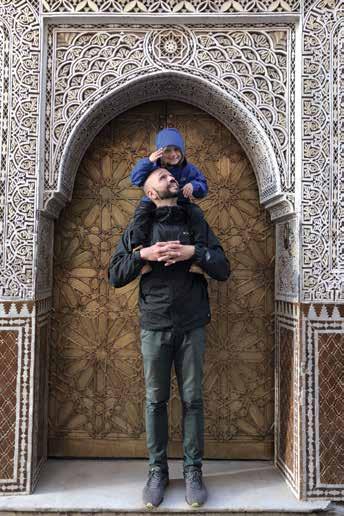

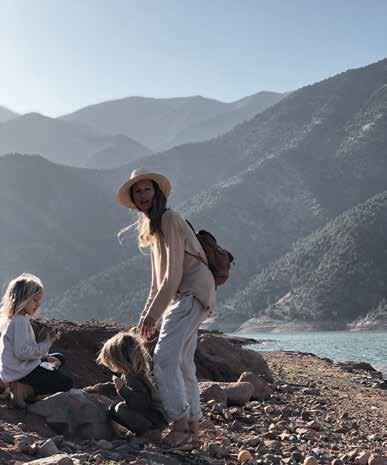
Photos courtesy of Photos courtesy of Jessica Perlaza @kindlerofglowJessica Perlaza @kindlerofglow
Jessica Perlaza had always wanted to live abroad but felt rooted in Orlando. In 2008, when the recession hit, Jessica and her husband, Mayo, decided to leave their careers in Central
Florida and move to Korea to teach English. Once in Asia, their minds were opened to a whole new world, and they couldn’t see themselves returning to their home in Florida. They stayed in Korea for four years and traveled around Asia. In 2013, their first son, Joa, now 7, was born, and Jessica felt the pull to be near family. So they moved back to the U.S. for a few years, spending their time in Orlando and Chicago. Shortly thereafter, their second son, Tao, now 5, was born. The Perlaza family enjoyed having the support of family members nearby but started to feel like they sacrificed what they wanted for themselves and their children. Their family values have always been to have more time together — Jessica and Mayo never felt that they needed much monetarily or materially. They wanted to go back to their old lifestyle living abroad, but they were filled with fear and doubt about making the right decision for their family. Then one day while on Facebook, Jessica came across a worldschoolers group. She read through some of the conversations and was inspired by what other families were doing. It gave her the motivation to make a change. Her husband was teaching online, so he could work remotely from anywhere in the world. In 2017, the Perlaza family embarked on a journey to travel around the world for a year, finishing their trip in Portugal. Their current home is nestled in the mountains, about 30 minutes away from the town of Aljezur (population 5,000). Portugal is part of the Schengen Area, where Americans are allowed to stay 90 days, leave for 90 days, and then return for another 90 days. It can be a bit confusing, but there are apps to help calculate the days and keep track. No matter where they travel, the Perlazas love having a home to return to. Jessica believes it is important to maintain balance. She admires families who keep moving around continuously, but for her family, it is crucial have a home with familiar surroundings where they feel balanced and can build a community. Jessica doesn’t like to label how their children learn. Homeschool vs. worldschool vs. unschool — they flow through all of those depending on where they are in their lives and in the world. When moving around, they spend a lot of time outdoors. The boys are very curious and inquisitive. On a recent trip to a nearby river, Tao discovered that he could make colors and write with some of the rocks. So Jessica ran home, grabbed some paintbrushes and paper and turned the experience into an art lesson. Sometimes they will sit at the table and practice more traditional learning, but they try to stay flexible and adapt as needed. When the Perlazas arrived in Portugal, they looked into forest schools. These are schools where children spend almost all of their time learning outdoors in natural environments. The forest school in Portugal has a small schoolroom that they use in the case of terrible weather, but otherwise, the kids are outside. The school has a tent where children can sit and read; it also has a garden and animals. When asked what her hope is for her boys, Jessica replied, “My hope is that they will be happy. The most important value in our family is time together. I hope they will always hold onto that.”
Follow the Perlazas’ story through Jessica Perlaza's photography on Instagram @kindlerofglow.
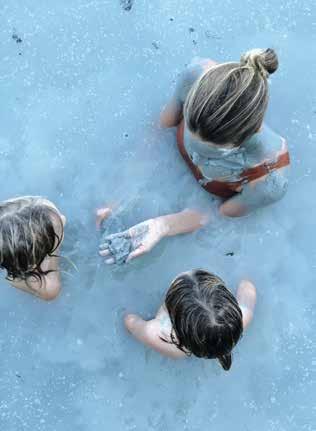
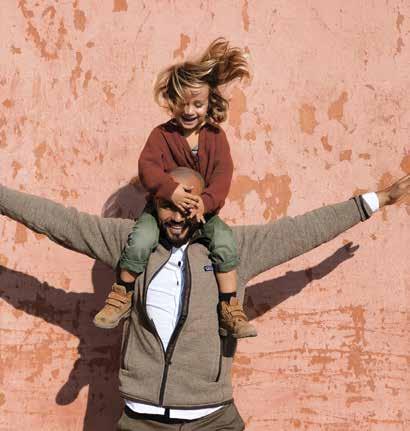
Collaborative Corner Panelists (L to R): Nikki Waitt, Amy Moncion, Dr. Karen Hans, Jessica Barisano, Alyssa Bloxam, Aubrey Kohler, Susan Robins, Leslie Haynes, Erica Clark, Blaire Harter


Jessica Barisano
Pictured: Jessica Barisano (left) and Alyssa Bloxam (right)
Words by Amy Nielsen | Photos by Jessica Friend
Jessica Barisano is the founder and president of Collaborative Corner for Exceptional Children, a nonprofit organization that provides support to the special needs community. As passionate as she is about her work at Collaborative Corner, Jessica never anticipated her life would have taken this completely unexpected yet rewarding turn. What led to Collaborative Corner is both a heartbreaking and heartwarming story filled with loss and love, and ultimately the unwavering determination of a mother to dedicate her life to ensuring no parent had to go through what she did. Jessica, a competitive swimmer who grew up in the Florida panhandle, said, “My parents instilled the values of hard work and responsibility in my sister and me from an early age.” Those values led her to begin working in the hospitality industry at the age of 14, and she quickly fell in love with the diversity she found within it. She went on to graduate from the Rosen College of Hospitality Management at the University of Central Florida in 2006 and began her career in Los Angeles. There she met her husband, Jonathan, who is also in the hospitality industry. Eventually, a job opportunity brought the couple back to Florida, where they planned to start what they hoped would be a large family. At that time, Jessica was pregnant with her first son, Trent. Her pregnancy was considered high risk due to a rare genetic disorder. Holoprosencephaly, which took her brother’s life shortly after his birth, impacts the brain’s ability to develop into two hemispheres properly. To Jessica and Jonathan’s relief, Trent and their second son, Jake, were not affected. Sadly, the couple later lost two sons in utero: one due to unknown causes and one due to holoprosencephaly. Despite their loss, Jessica and Jonathan still longed to grow their family. The couple pursued in vitro fertilization, but Jessica wasn’t a good candidate for the procedure. Next, they explored adoption, which also ended with disappointing results. Amid that grief, the family also had growing concerns about their oldest son, Trent. They noticed he wasn’t hitting certain developmental milestones within the normal range. He was also much smaller than his same-age peers. Doctor after doctor either dismissed the family’s concerns or labeled him “failure to thrive,” which meant he wasn’t growing as expected. However, no one could explain why. This uncertainty set Jessica on a journey for answers. Those answers were difficult to find; that is, until she met Dr. Stacey McConkey, a complex care pediatrician.
-Jessica Barisano
In Dr. McConkey, the Barisanos found what they had never experienced: a doctor who listened. After hearing the parents’ concerns, Jessica said Dr. McConkey told her something no other specialist ever had, “I don’t know what is going on with Trent. But something is, and I will find out what it is.” Dr. McConkey delivered on that promise and soon diagnosed Trent with Hormone Growth Deficiency (HGD), a rare disorder in which the pituitary gland doesn’t function properly, as well as a Rathke’s Cleft Cyst on the base of that gland. Trent eventually received additional diagnoses of Autism Spectrum Disorder, Attention Deficit Hyperactivity Disorder and Sensory Processing Disorder. Later, the couple’s youngest son, Jake, would also be diagnosed with a milder case of HGD. Jessica’s experiences of grief and loss, coupled with the overwhelming challenges of uncovering Trent’s diagnoses, began to transform into a passion for helping families like her own. Together with Alyssa Bloxam and Kristen Bencomo, she came up with the idea for Collaborative Corner for Exceptional Children.
Collaborative Corner is a nonprofit organization that provides resources and access to a panel of industry-leading professionals at no charge to families of special needs children. The organization also provides educational advocacy and other helpful services. Parents can reach out to the panel, which includes experts such as speech therapists and behavior analysts, to ask questions and receive quick responses. Jessica’s vision was that no parent would ever feel the way she once did: overwhelmed, undersupported and unable to get answers. She said, “It is my hope that, together, we can provide the families of children with exceptional needs a sense of community and understanding, and in addition, arm them with an abundance of credible resources all in one place.” For Jessica, creating Collaborative Corner was how she was ultimately able to grow her family because each family she works with becomes part of her own.
Collaborative Corner Panelists:
JESSICA BARISANO Founder | Special Education Advocate ALYSSA BLOXAM Co-Founder | Speech-Language Pathologist DR. KAREN E. HANS Panelist | Board Certified Behavior Analyst, Education Advocate
BLAIRE HARTER Executive Director | Speech Language Pathologist, Feeding Specialist , Education Advocate LESLIE HAYNES Panelist | Special Education Teacher & Parent Advocate AUBREY KOHLER Director of Community Affairs | Occupational Therapist ALYSHA SKUTHAN Panelist | Pediatric Occupational Therapist SUSAN ROBINS Panelist | Pediatric Physical Therapist NIKKI WAITT Associate Director | Registered Behavior Technician & Special Education Teacher AMY MONCION Qualified Supervisor | Licensed Clinical Social Worker AMY NIELSEN Panelist | Early Intervention Specialist and Parent Advocate ERICA CLARK Panelist | Speech Language Pathologist with Certification in Listening and Spoken Language




